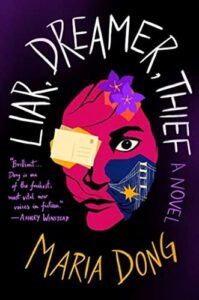When I started writing my debut novel, Liar, Dreamer, Thief, I knew two things. First, I wanted a mystery to form the novel’s core. Second, it was important to me that at least some of the main revelations—which, in a mystery, often form touchstones for the character’s internal journey—not be entirely rational.
The urge for this probably came from not being able to relate to the average mystery protagonist: an intellectually brilliant, cool cucumber whose only weakness usually takes one of two forms: a chemical addiction, like House and his pain pills, or a personality too abrasive to form close relationships (save whoever the Watson stand-in is). Either way, a sleuth’s fatal flaws (I mean flaws as written, because both of these issues can actually destroy you as a human being) can’t impair their ability to make rational deductions, because in the mystery novel, reason—of both the deductive and inductive varieties—is king.
And while I’m sure there are real people out there who embody these traits, with my protagonist, I wanted to dig my teeth into someone messy, someone whose logic was flawed and whose emotional world was more important than their intellectual one. I also wanted a plot in which the engine forward sometimes escaped rational explanation—and where the who, what, and how were only part of the reader’s experience.
Writing this book changed me, but it wasn’t until researching this article that I became fully convinced that readers of all types should embrace what I’ve taken to calling the “messy mystery.”
Hopefully, by this essay’s end, I’ll have convinced you, too.
#
Understanding why we should embrace the messy mystery starts with understanding where we are now. In modern media, most mysteries hold fairly close to the intent of the “fair-play mystery”, the rules of which were codified by Father Ronald Knox in 1928 in his Ten Commandments of Detective Fiction. At its core is the idea that mysteries are a kind of contract: I, as the author, give you all the clues you need to solve the mystery yourself, with the challenge being that you do so before the sleuth. To facilitate this, certain devices are off-limits: anything supernatural, undiscovered poisons or inventions, flashes of intuition without explanation, twins.
There’s nothing wrong with a good fair-play mystery. Like escape rooms, point-and-click games, and trivia nights, they’re fun. The reader gets to feel clever while exercising analytical and problem-solving skills, which is a win-win.
But as someone who’d previously been trying to get published for, uh, a while, one thing I can tell you is that publishers don’t only love fair-play in a mystery, they usually demand it—and, by extension, a complete eradication of general ambiguity in a book. By the end, all threads should be nipped up, all clues explained, and the villain served up for justice.
This, of course, is due to consumer demand. The TV Tropes article around clueless mysteries—the fair-play mystery’s antithesis—has a number of disclaimers about the genre: that people “hate them” and will “swear off (or at) any author that serves them up.” That some readers are willing to try them, but only when warned in advance. In other words—writing a story that doesn’t tie up in a perfect bow, or that even whiffs of “unfairness”, could greatly impact a title’s sales.
One result of this is that the vast majority of mysteries take place in a world that doesn’t reflect our own in incredibly important ways. For example, crime fiction and shows don’t often allude to the fact that there is “very little science behind some of the forensic ‘sciences’ used in court to imprison and sometimes execute people”, or that the police have an abysmally low clearance rate for most crimes: only about 50% of murders in most cities are cleared. Past that mark, the numbers get worse; only 30% of rapes are cleared, 27% of robberies, and 21% of arsons.
This difference between fact and fiction might seem innocuous, but media representations have deep, lasting effects on how a person perceives and interprets the world. We all know that friend who’s seen every episode of “Grey’s Anatomy” and now thinks they can diagnose people via an eavesdropped conversation on the bus, but a systematic review examining the effects of similar shows concluded that medical television affects health knowledge and attitudes in measurable ways. Fictional crime dramas change how people think the legal system works—even when those people are legal professionals—including our beliefs on how effective police are and if they are justified in their use of force.
The issue of how accurately fiction should represent the world we live in is not an easy one. All stories are interpretations, and therefore necessarily distorted in some way from reality. I used to think the motivation behind the author’s distortion was the most important thing, but now, I’m not so sure. In the original fair-play mystery commandments, Father Knox included: “No Chinaman must figure in the story.” Although this was an effort to push back against the racist “shifty Oriental” stereotypes of the time, it was also an attempt to make the story more “fair”, as a token minority character would be seen as either the automatic culprit or a red herring. Those are noble goals, but the result was omitting any mention of people like myself from an entire genre for decades—a decision that, given how much the media we consume affects the way we think, has larger implications for a society than it might appear on the surface.
And this question of the intersection between fiction and morality is a sticky one. Indeed, Philosopher Dr. Rachel Haliburton argues that detective fiction helps to educate our “moral imagination”—that by engaging with detective novels, we learn about the underlying moral order of society. Once broken by murder, that moral foundation can only be restored when the criminal is brought to justice.
The idea of living in such a tidy, ordered world is intrinsically appealing. But I worry that it makes us complacent—because the truth is that the moral order of our real world is often very much lacking in justice, particularly for the marginalized. And manipulating media is an easy way to influence our values, including our feelings about fundamental institutions: there’s a reason the Pentagon requires that any script that wants to use military technology, equipment, or personnel must portray the military in a positive light.
Whether we’re talking about real-life knowledge or our moral foundations, the imaginary worlds a person consumes changes them—which means our choices about the fiction we engage with matter.
#
A book is full of compromises. The author has a vision—but so does the agent; editor; and the art, marketing, and publicity departments—all of whom are desperate for the book to succeed.
I was no exception to this rule of compromise. During the process of editing Liar, Dreamer, Thief, many ambiguities were removed for the benefit of the reader: red herrings sorted out, emotions clarified. Others, I clung to as if my life depended on them: clues that go nowhere, coincidences that are never explained.
I was particularly precious about the main character’s hallucinations and delusions. I understood that readers would want the closure of knowing what “objective” reality outside the character’s experience was, but I’m someone who doesn’t always get that closure in her own life. There was a moment during developmental edits where the stress of diving so deeply into mental illness had driven me to old habits; I became convinced that until I finished the current draft, I was vulnerable to some terrible metaphysical consequence that I couldn’t name and wouldn’t see coming. I knew rationally this was ridiculous, but that knowledge didn’t change my behavior. It still felt real, and there was no way to disprove it. As such, it was my reality.
Ultimately, having written a world that reflected the one I personally lived in, a world that I’d rarely seen represented in fiction in anything but the most disparaging ways—I wasn’t willing to give that up. But in the fallow months between edits and publication, I worried often about whether I’d done the wrong thing, if I’d doomed my book and my career as a writer.
Eventually, I found solace in an unlikely place: the philosopher Dr. Ruth Chang’s Ted Talk on how to make hard choices. Dr. Chang argues that choices aren’t just reflective of who we already are, but that we’re instead remaking ourselves with every choice—especially the choices that have no rational, “best” answer.
If that’s the case, maybe my desire to keep my book messy means I am remaking myself into someone who believes that others will be excited to engage with mysteries in environments that more closely reflect our real world—where observations can lie, people aren’t always logical, and the hero’s victory is at best a mixed bag. Maybe the readers, too, are remaking themselves, engaging in ways that will help us transform our society into one that better understands and honors the complexities inherent in the human condition.
***


















